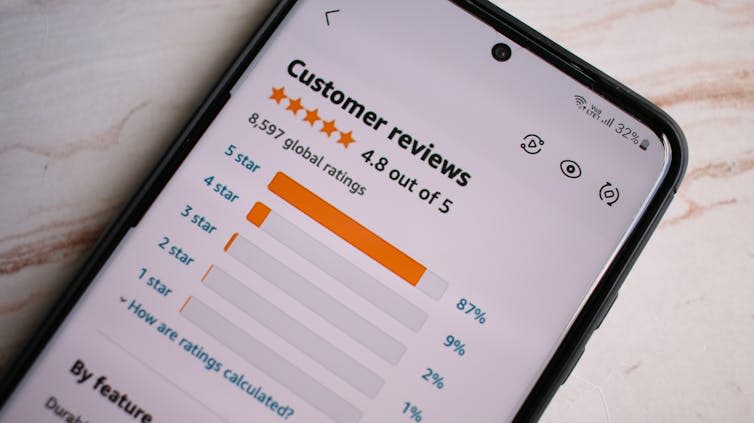Before you buy something, or visit a new restaurant, or see a new movie, you might be tempted to check the reviews online. Researching what strangers think about what we might want is a familiar part of the modern consumer experience.
But how can we know which reviews to trust? Which ones are written by honest customers sharing their real experiences, and which ones are posted with ulterior motives?
While consumer reviews can guide us towards the best products and services, lurking in the shadows are deceptive reviews, carefully designed to deceive and manipulate. Fake feedback, you might call it.
A competitor may submit a fake negative review, for example, hoping to cast doubt on the quality of a particular product. Or someone with a financial interest in a service might invent a fake positive review to give them a dishonest boost in the market.
All of these can have a significant impact on the public profile of a business.
In 2023, the popular travel website Tripadvisor experienced a massive influx of user-generated content, with more than 30 million reviews submitted by more than 17 million members. But within this vast sea of apparent customer feedback, 1.3 million reviews were identified as fraudulent and subsequently removed.
In addition, 33,194 businesses were penalized for engaging in deceptive practices. And in the UK, government research found that between 11% and 15% of reviews in specific product categories, such as consumer electronics and home and kitchen goods, were considered fraudulent.
Crack the code
To combat fake reviews, companies including Amazon have started using artificial intelligence (AI) to prevent the publication of hundreds of millions of potentially fraudulent reviews, ensuring credibility the platform.
But research suggests there are a number of things consumers can do to protect themselves.
Trust your instincts: When looking at reviews, rely on your intuition. Authentic feedback tends to be balanced, presenting the positive and negative aspects of the product or service. If a review seems overly positive or overly critical without substantiation, be careful.
Read between the lines: Pay attention to the language and tone used in reviews. Feedback often sounds genuinely personal, reflecting the reviewer’s unique experience. Be wary of reviews that are generic, repetitive, or over-hyped, as they can be deceptive endorsements.
Validate the source: Examine the reviewer’s credentials to determine their credibility. Genuine reviewers usually provide specific details about their interaction with the product or service, such as features, delivery timelines, or contact with customer service. Criticisms of the approach lack expertise with skepticism.
Look for patterns: Be alert for anomalous patterns in reviews, such as a sudden surge of positive or negative feedback within a short time frame. These anomalies may indicate attempts to manipulate ratings rather than genuine consumer experiences.
Review the reviewers
So in the same way you can protect your computer from viruses, or stay alert to attempts to get hold of your personal information, it is important to keep yourself informed about the common methods used to deceive consumers . Well-known platforms such as Amazon and Tripadvisor usually provide guidelines for spotting fake feedback, while consumer advocacy groups and online forums dedicated to consumer awareness can provide valuable insights.

Websites and platforms also have a responsibility to ensure that users are receiving reliable information. And advances in AI technology have introduced new tools to help identify and flag potential fake reviews.
These AI-powered solutions play a critical role in preserving consumer trust and market integrity by using machine learning to analyze patterns and identify suspicious interactions on social media platforms.
By investing in this type of technology, companies can more effectively combat the spread of fake reviews and maintain the credibility of their review system. They can also build trust and confidence in the authenticity of the reviews provided.
In a digital world, being able to distinguish between genuine feedback and deceptive endorsements is critical to making informed decisions. And if you come across a review that you suspect is fake, it’s always worth reporting it to the platform or website where it was posted. By informing authorities, you’ll strengthen the integrity of online review systems – and help your fellow consumers make better decisions.
This article from The Conversation is republished under a Creative Commons license. Read the original article.


Nick Hajli is affiliated with Loughborough University. Nick Hajli does not work for any company or organization that would benefit from this article, does not consult with, share ownership of or be funded by any company or organization that would benefit from this article, and has disclosed no affiliations relevant beyond their academic appointment.
Nick Jennings does not work for, consult with, own shares in or receive funding from any company or organization that would benefit from this article this, and has not disclosed any relevant connections beyond their academic appointment.